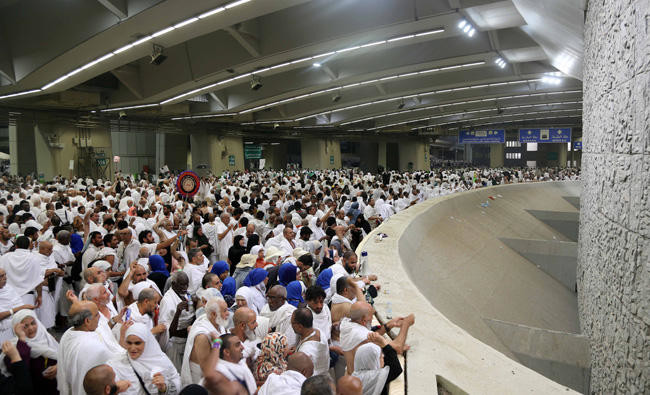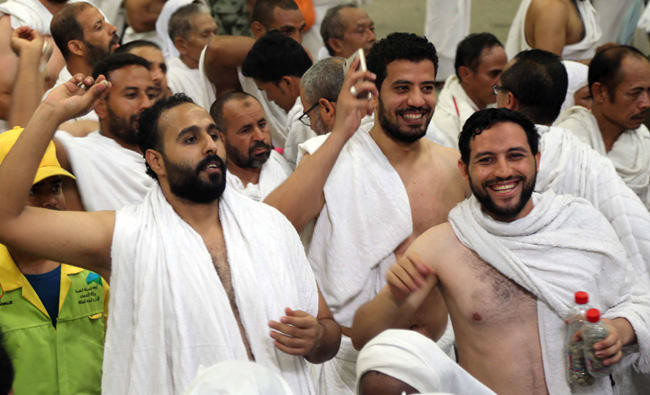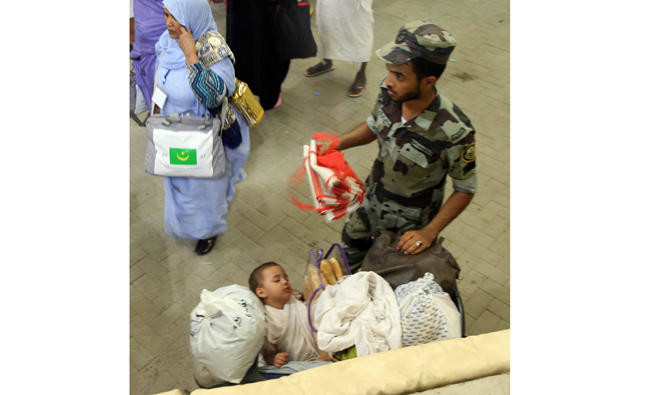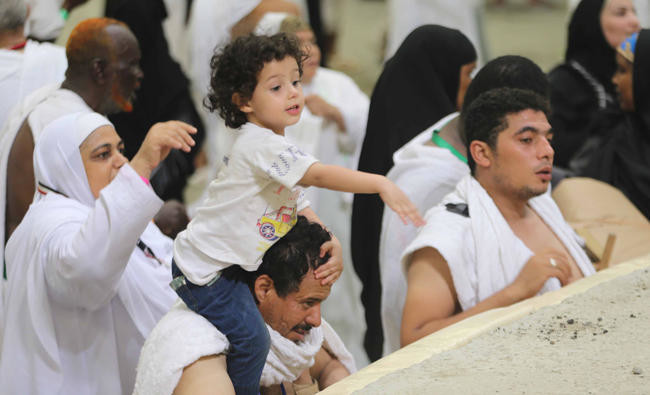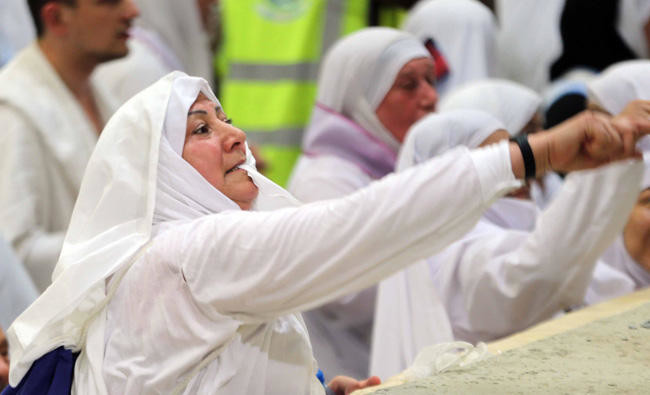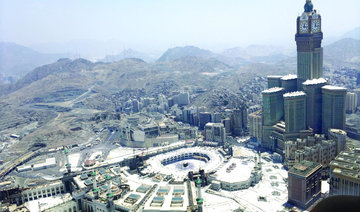MINA, Saudi Arabia: In stifling heat, a Saudi security guard sprayed Muslim pilgrims with water as they advanced through Mina for the final rite of the Hajj, the “Stoning of the Devil”.
Saudi Arabia reported no major health or safety upsets at the Jamrat Bridge, as the Muslim faithful made their way through the last leg of the five-day pilgrimage.
For many, the pilgrimage, which all Muslims must perform at least once if physically and financially able, has been a lifelong dream.
Amin Hashkir, a 26-year-old from Casablanca in Morocco, traveled to western Saudi Arabia, home of the holiest sites in Islam, together with his sister and mother, who was unable to physically perform the stoning rite herself.
“My father passed away in 2011, and we’ve been trying to make it here ever since to perform Hajj for him,” Hashkir explained on a sidewalk in Mina, near Makkah. “It was what he felt was missing from his life.”
Hashkir’s mother was also counting on her son to fulfil her dream of Hajj. “My mother is sick, so I offered to throw the stones for her.”
The 2015 stampede was the deadliest disaster ever to strike the Hajj, one of the five pillars of Islam. Hundreds more lives have been lost in several stampedes during the stoning ritual over the past 20 years.
Saudi Arabia says it has deployed more than 100,000 security personnel to keep pilgrims safe this year.
The state-run SPA news agency on Thursday reported more than 2.35 million people were participating in the Hajj this year, including 1.75 million from outside the kingdom.
Authorities said on Friday there had been no major health or safety upsets in Mina this year.
Col. Sami Al-Shweirekh, head of outreach at Saudi Arabia’s General Security, hailed the “success” of the intensified security measures at a press conference.
Hours earlier, huge crowds dotted with colorful umbrellas to shield pilgrims from the sun took part in the stoning rite under strict surveillance, with police tape guiding the flow of pilgrims, cameras everywhere and helicopters hovering overhead.
“It’s different every year,” said Najat Malik, 45, a Sudanese Red Crescent employee who traveled from Khartoum for the Hajj.
“Some years there are less pilgrims because of fears and warnings of disease. But this year, I feel like there are a lot more people here.”
Traditionally, seven pebbles are thrown at a post representing the devil, emulating the actions of the biblical prophet Abraham.
Since 2004, it has been replaced by walls to accommodate the rising numbers of pilgrims.
By Friday afternoon, temperatures had reached 41 degrees Celsius (106 Fahrenheit), with many suffering from dehydration or heat exhaustion.
“Two pilgrims fainted right in front of me this morning,” said Almas Khattak, a Pakistani volunteer in Mina.
At the bridge, an elderly woman had collapsed onto a stretcher as her relatives tried to revive her, splashing her face with water before calling for assistance.
The shadow of the 2015 stampede still looms large over the ritual.
Iran, which with 464 dead reported the largest number of victims in the disaster, did not send its pilgrims last year to the Hajj in Saudi Arabia, as authorities in the two countries failed to agree on logistics.
Iranian authorities say more than 86,000 Iranian pilgrims are taking part this year, each equipped with an identity bracelet in case of any accident.
The stoning ritual, which lasts until Sunday, marks the first day of the Eid Al-Adha feast, or the feast of sacrifice, which commemorates Abraham’s willingness to sacrifice his son.
The holiday is marked by the sacrifice of sheep instead by Muslim communities around the world.
Muslim pilgrims mark final Hajj rite with ‘Stoning of Devil’
Muslim pilgrims mark final Hajj rite with ‘Stoning of Devil’
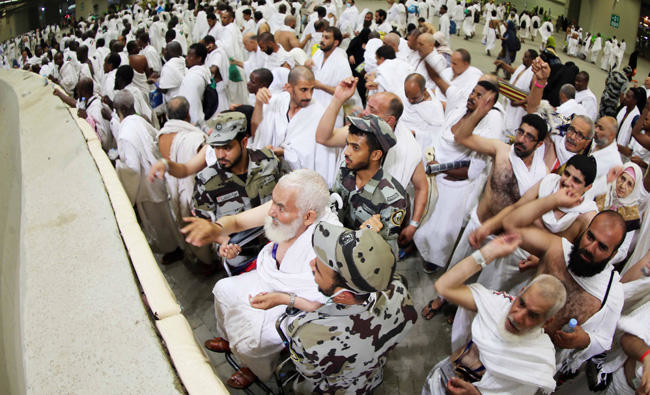
Saudi energy minister joins launch of consortium to promote sustainable concrete

- NovusCrete seeks to accelerate adoption of durable saltwater concrete
- Initiative led by the Oil Sustainability Program and includes leading Saudi organizations
RIYADH: Saudi Energy Minister Prince Abdulaziz bin Salman on Sunday attended the signing of a memorandum of understanding to launch the NovusCrete consortium, a global collaboration to develop and accelerate the adoption of sustainable and durable saltwater concrete.
The consortium, led by the Kingdom's Oil Sustainability Program, also seeks to create standards for using seawater in concrete, promote sustainability in construction by recycling waste, extend infrastructure lifespan, and reduce environmental impact.
Leading Saudi organizations taking part in the consortium include the Public Investment Fund, Saudi Investment Recycling Company, NEOM through its Design and Construction Sector, Sika, and ClimateCrete.
The participating parties said they aim to develop sustainable technologies for concrete production, focusing on reducing the construction sector’s carbon footprint and enhancing material efficiency.
They will also improve Saudi Arabia’s construction sector by promoting seawater concrete solutions using local materials.
The signing ceremony in Riyadh was also attended by Yasir Al-Rumayyan, governor of PIF; Saad Al-Qasabi, governor of the Saudi Standards, Metrology, and Quality Organization; and Khalid Al-Salem, president of the Royal Commission for Jubail and Yanbu.
The new consortium includes international organizations, such as the American Concrete Institute.
It aligns with Saudi Vision 2030, which aims to balance economic growth and environmental sustainability.
India celebrates 76th Republic Day in Riyadh, highlighting cultural ties with Saudi Arabia

- ‘Let us continue to work together,’ says Ambassador Suhel Ajaz Khan
RIYADH: Ambassador of India to the Kingdom Suhel Ajaz Khan underlined that a mutual appreciation of culture was strengthening ties between Saudi Arabia and India during the latter’s 76th Republic Day celebration in Riyadh.
“A shared love for culture brings our countries together,” he said. “From Bollywood cinema to yoga, music, and food, we have continued to be inspired by each other.
“We were delighted to participate in the annual Riyadh Season 2024 under the Global Harmony Initiative of the Saudi government,” he added, referring to a series of events which began in October to celebrate the culture of the Kingdom’s different expatriate groups.
India’s Republic Day was celebrated on Sunday evening in the Cultural Palace in Riyadh and brought together both Saudis and Indians in a commemoration of culture and history.
Omar Khan, an Indian native who has called the Kingdom his home for nearly three decades, attended the event.
The product manager at STC Technologies told Arab News: “I’m a second-generation, third-culture kid. I’ve seen Republic Days for the past three decades in Saudi Arabia.
“I think one thing that’s very important is the representation of my country. It makes me proud that, although India is a distant land for me and Riyadh is home, I feel very connected, and I see that the partnership of Saudi Arabia and India has grown leaps and bounds.
“I’m very proud to say that I am somebody who grew up in Saudi Arabia and yet is Indian by his roots.”
Indian youngsters took to the stage following the ambassador’s speech to perform a dance routine showcasing their country’s music and culture.
The embassy event also featured multiple booths to highlight the many Indian-owned businesses and products in the Kingdom, in the food, tourism, and medical sectors.
India’s Ministry of Tribal Affairs also had a booth to showcase handmade products from the country, including coats, artifacts, and silk pashminas.
Staff from Aster Sanad Hospital were present to help visitors with medical issues.
The ambassador said: “India will work with our international partners, including Saudi Arabia, to contribute to a world of peace, prosperity, and inclusive growth.
“With these words I would like to express my sincere gratitude to the Kingdom of Saudi Arabia and its people for their long-standing friendship and support.
“Let us continue to work together to build a future based on mutual respect, understanding, and cooperation.”
World Monument Fund to protect historic sites with Bahraini, Saudi, and Gulf partners

- There is a lot of interest in heritage of GCC countries, says fund president
MUHARRAQ: On a historical preservation tour around the Arabian Gulf region, the World Monument Fund recently visited the city of Muharraq in Bahrain before visiting Saudi Arabia.
A historically rich city with a story that dates to the late 19th century, Muharraq is the cultural heart of Bahrain.
Prior to gaining independence from British rule in 1971, Muharraq was Bahrain’s capital and center for public and governmental administrative, educational, and planning projects, before being replaced by Manama in 1923.

Though the city held many significant historical sites, its residents began to leave soon after and the area was left neglected.
Sheikha Mai bint Mohammed Al-Khalifa, president of the Bahrain Authority for Culture and Antiquities and chairperson of the Arab Regional Centre for World Heritage, founded the Sheikh Ebrahim bin Mohammed Al-Khalifa Center for Culture and Research in 2002, a non-profit organization, as a form of cultural renaissance.
Since its founding, the center’s purpose has been to form a space where thinkers could gather and share ideas in philosophy, literature, poetry, art, and culture.
FASTFACT
In discussion with the Royal Commission of AlUla and the Heritage Commission for future partnerships, the World Monument Fund is visiting AlUla as well as Historic Jeddah for the Islamic Arts Biennale.
The most significant aspect of its work, however, has been the house restoration projects in Muharraq and Manama, where 28 historical houses, many of which belonged to prominent Bahraini figures and families, have been brought back to life under the leadership of Al-Khalifa.

Over the weekend, a delegation from the World Monument Fund visited the Sheikh Ebrahim Center to see the restored houses firsthand.
Celebrating its 60th anniversary, the mission of the World Monuments Fund is to safeguard heritage all around the world, Benedicte de Montlaur, president of the fund, told Arab News.
Al-Khalifa was awarded the Watch Award by the World Monument Fund in 2015 and after a few visits to their offices in New York, she was asked to join them as a member of the board of trustees, making her the only Arab on the board.

In an interview with Arab News, Al-Khalifa said she felt it was her responsibility to keep them informed about the Arab world and all that it has to offer.
“The picture that travels to the world is not always true or complete, and in our Gulf countries there are many landmarks, monuments, and national identities that we would like to showcase,” she said.
The delegation first visited the Abdullah Al-Zayed House for Bahrain Press Heritage, the house of the first journalist to start a daily newspaper in the kingdom and which now hosts local and international speakers from the media sector.

Next up was the Kurar House, where Al-Kurar Ladies spend their time embroidering traditional Bahraini thobes and other garments by hand. Like the strings of an instrument, three women work on the thread separately, and one stitches them together simultaneously on the fabric, creating a harmonious rhythm.
The delegation also got to see the only room left of Sheikh Ebrahim’s original house, a room that dates back around 200 years.
Following the tour of the Sheikh Ebrahim restored houses projects, they also visited the houses of the Pearling Path and the UNESCO World Heritage Site, the Dilmun Burial Grounds.

With over 70 projects in the Arab world including the Louvre, the Smithsonian, and Babylon in Iraq, restoring the Imam Palace in the city of Taizz in Yemen, and Abydos in Egypt, the fund’s next mission is to become more active in the Gulf region.
“We see that there is a lot of interest in heritage in countries from the GCC,” de Montlaur said.
The first stop was Kuwait, where plans are underway to have Failaka Island added to the UNESCO World Heritage List.

After visiting their partners from the UNESCO Regional Center and the Sheikh Ebrahim Center in Bahrain, the delegation’s next destination is Saudi Arabia, “a country that is devoting a lot of time and energy at the moment to heritage,” de Montlaur said.
In discussion with the Royal Commission of AlUla and the Heritage Commission for future partnerships, the World Monument Fund is visiting AlUla as well as Historic Jeddah for the Islamic Arts Biennale.
“If you do not know your past, it is very difficult to build a future because you lose your identity,” de Montlaur said. “Especially in countries like here, that are developing really fast … it is extremely important also to pay attention to heritage places because it is very easy to destroy them, but when they are gone, they’re gone. They cannot be rebuilt.

“Once you have lost the spirit of a place and built modern buildings everywhere, then you have lost touch with your past.”
Preserving the land’s past also draws in crowds of tourists who get to experience each country’s distinct identity and history for the first time to learn about the place and its people, de Montlaur added.
“Heritage places represent the pinnacle of human achievements of history.”

On how the Arab world can work together to create a stronger stance for historical preservation, de Montlaur said: “I think it is already happening,” citing the various projects in Iraq, the UAE, Saudi Arabia, and Bahrain, etc.
She also added: “There is a big need for heritage preservation in other countries outside of the GCC, so they could align their forces.
“There is so much need in Egypt, in Gaza … in Syria … and I think what is very much part of the Arab countries is this solidarity, they can all unite around this heritage because this is the heritage of all the Arabs.”
Al-Khalifa added: “In Gaza, many landmarks have been destroyed, part of the upcoming plan is restoring some of those sites.
“It’s really a heritage of humanity as a whole and that is why every one of us, whether we are from the region or not, should care about it. But before anything else, it is the history and identity of the Arabs,” de Montlaur noted.
Speaking on the shared language and culture that unite Saudi Arabia and Bahrain, Al-Khalifa, who is also a part of the Royal Commission of AlUla, said that emotions and love between peoples are what bond them forever.
“This visit is not only to Bahrain but to our Gulf,” she said. “We always repeat: our Gulf is one, our goals are one, and our history is shared; so everything that distinguishes us — from identity to monuments — is an extension of civilizations thousands of years old.”
Saudi permanent representative presents credentials to UNESCO chief

- Abdulelah Altokhais is seeking to strengthen Kingdom’s cooperation with UN agency
- Paris talks focus on collaboration to promote coexistence among peoples and cultures
RIYADH: Abdulelah Altokhais, Saudi Arabia’s permanent representative to UNESCO, presented his credentials to Audrey Azoulay, the organization’s director-general, at its headquarters in Paris on Sunday.
The Kingdom’s mission to the UN-affiliated agency wrote on the X platform that Altokhias is “continuing Saudi Arabia’s efforts to strengthen joint cooperation with UNESCO and member states toward a better-shared future.”
During his meeting with Azoulay, Altokhais reviewed Saudi Arabia’s contributions to numerous UNESCO projects through its role in the organization’s Executive Council and membership of the World Heritage Committee.
He emphasized the need to enhance collaboration with UNESCO to promote peace and coexistence among peoples and cultures.
Altokhais studied philosophy at the University of Florida, and has worked in the cultural heritage, planning, and tourism fields, the Saudi Press Agency reported.
Jeddah governor receives Portuguese ambassador to Saudi Arabia

- The two men discussed issues of mutual interest
JEDDAH: Prince Saud bin Abdullah bin Jalawi, the governor of Jeddah, received Nuno Mathias, Portugal’s ambassador Saudi Arabia, in Jeddah on Sunday.
During the meeting, the two men discussed issues of mutual interest, the Saudi Press Agency reported.
Meanwhile, Abdulelah bin Ali Al-Tokhais, the permanent delegate of the Kingdom to the UN Educational, Scientific and Cultural Organization, presented his credentials to Audrey Azoulay, the organization’s director-general, continuing Saudi Arabia’s efforts to strengthen cooperation between UNESCO and member states, the official account @KSAForUNESCO wrote on X.



